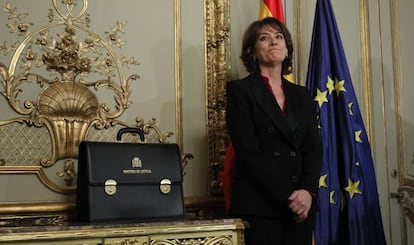Spain’s public prosecutors uneasy about government’s pick for prosecutor general
Critics warns that naming ex-Justice Minister Dolores Delgado to the top role jeopardizes the judiciary’s image of impartiality

The Spanish government’s proposal to appoint Dolores Delgado as the new prosecutor general has been met with concern by several legal associations, which see it as an attempt by the newly confirmed prime minister, Pedro Sánchez of the Socialist Party (PSOE), to keep public prosecutors in check.
But the nomination was applauded by progressive associations, which do not see any problem with the fact that Delgado served as justice minister under Sánchez until last Friday, when she was replaced as part of the prime minister’s new Cabinet appointments.
There is only one precedent in Spain’s modern democratic history of a former minister transitioning directly to prosecutor general: Javier Moscoso in 1986, under the PSOE administration of Felipe González.
Political interference
The largest of the prosecutors’ associations, the conservative Asociación de Fiscales, said that the nomination is proof that the executive wants “to subjugate” the public prosecution services. Cristina Dexeus, president of the association, said she was “astounded” by a decision that “confuses citizens” because it makes it look like “there is political interference.”
The designation destroys all appearances of impartiality
Jorge Fernández Vaquero, AJFV
In a release, this group expressed “unease and concern at the image of politicization and lack of independence and impartiality that is being conveyed by placing a person who has been the justice minister until just a few hours ago at the top of the prosecution services.”
And the judges’ association Asociación de Jueces Francisco de Vitoria (AJFV) called the decision “unprecedented and detrimental.” The group’s spokesperson, Jorge Fernández Vaquero, said the designation “destroys all appearances of impartiality” in any future decisions made by the Spanish prosecution services.
“Almost any initiative of relevance in the serious matters that lie in the immediate political future will come under question because of the inevitable shadow of partiality,” he warned, alluding to pending legal issues in connection with the 2017 failed secession attempt by Catalan separatists.
But Delgado’s ties to the Sánchez administration do not represent an obstacle to the judges’ association Juezas y Jueces para la Democracia. Its spokesperson, Ignacio González Vega, underscored Delgado’s long career as a prosecutor herself, and said everyone should wait and see how she acts in her new position before reaching any conclusions.
And the progressive prosecutors’ association Unión Progresista de Fiscales (UPF) – which Delgado has belonged to – said its members are convinced that she will “act in the best interests of justice and with complete independence.”
Catalonia and Franco
Delgado initially joined Sánchez’s team in June 2018, when the latter reached power through a no-confidence vote against Mariano Rajoy of the Popular Party (PP). She was an independent at the time of her appointment, but has held a seat in Congress as a PSOE representative since May of last year.
Delgado will act in the best interests of justice and with complete independence, according to the prosecutor association UPF
While Delgado was justice minister, the Solicitor General’s Office, which represents the state in the courts and answers to the Justice Ministry, clashed with the prosecutors involved in the Supreme Court case against 12 leaders of the breakaway bid. While the public prosecutors – under then-Prosecutor General María José Segarra – charged the defendants with rebellion, the Solicitor General brought lesser charges of sedition.
The issue of Catalonia will continue to rank high on the new executive’s agenda after Sánchez committed to talks between the central and Catalan governments to discuss “the political conflict” in the northeastern region. This pledge secured endorsement for his investiture bid by the Catalan Republican Left (ERC), a separatist party whose leader Oriol Junqueras was tried and convicted of sedition by the Supreme Court last year.
The political fate of Junqueras and two other secessionist leaders, Carles Puigdemont and Toni Comín, have been the subject of a prolonged legal wrangle that has taken on an international dimension after the Court of Justice of the European Union issued a decision that has enabled the latter two to take up seats in the EU Parliament.
Besides the Catalan separatists’ trial, another issue that attracted heavy media attention during Delgado’s time at the Justice Ministry was the exhumation of the body of Francisco Franco from the Valley of the Fallen, where Delgado acted as a notary for the state to certify the transfer of the late dictator’s remains.
English version by Susana Urra.
Tu suscripción se está usando en otro dispositivo
¿Quieres añadir otro usuario a tu suscripción?
Si continúas leyendo en este dispositivo, no se podrá leer en el otro.
FlechaTu suscripción se está usando en otro dispositivo y solo puedes acceder a EL PAÍS desde un dispositivo a la vez.
Si quieres compartir tu cuenta, cambia tu suscripción a la modalidad Premium, así podrás añadir otro usuario. Cada uno accederá con su propia cuenta de email, lo que os permitirá personalizar vuestra experiencia en EL PAÍS.
¿Tienes una suscripción de empresa? Accede aquí para contratar más cuentas.
En el caso de no saber quién está usando tu cuenta, te recomendamos cambiar tu contraseña aquí.
Si decides continuar compartiendo tu cuenta, este mensaje se mostrará en tu dispositivo y en el de la otra persona que está usando tu cuenta de forma indefinida, afectando a tu experiencia de lectura. Puedes consultar aquí los términos y condiciones de la suscripción digital.








































